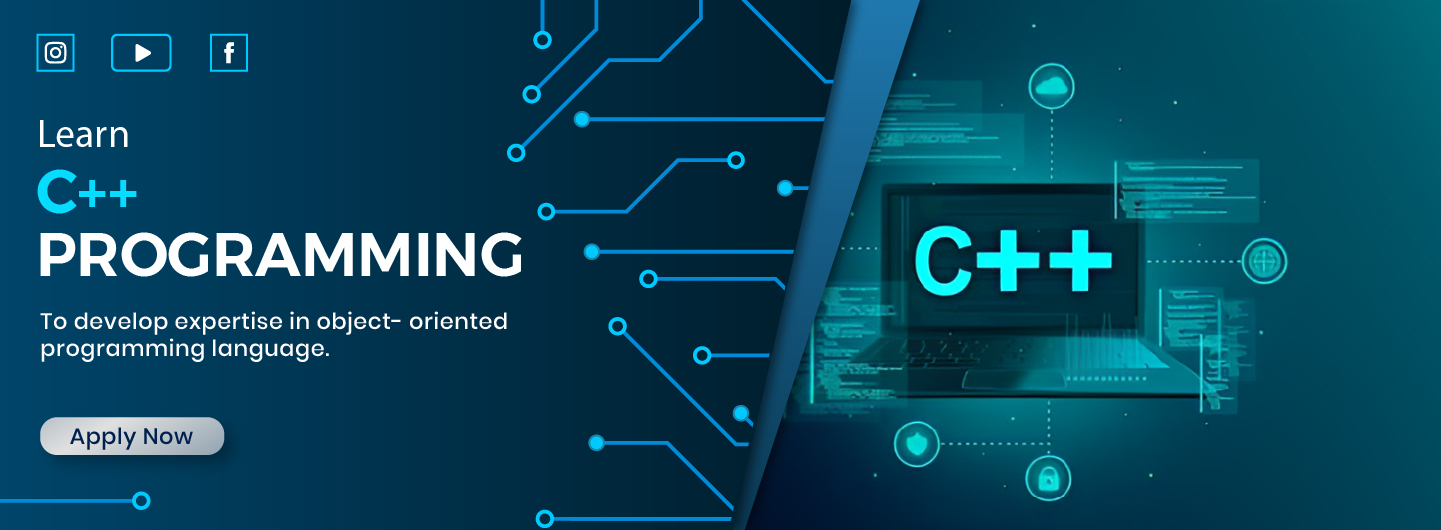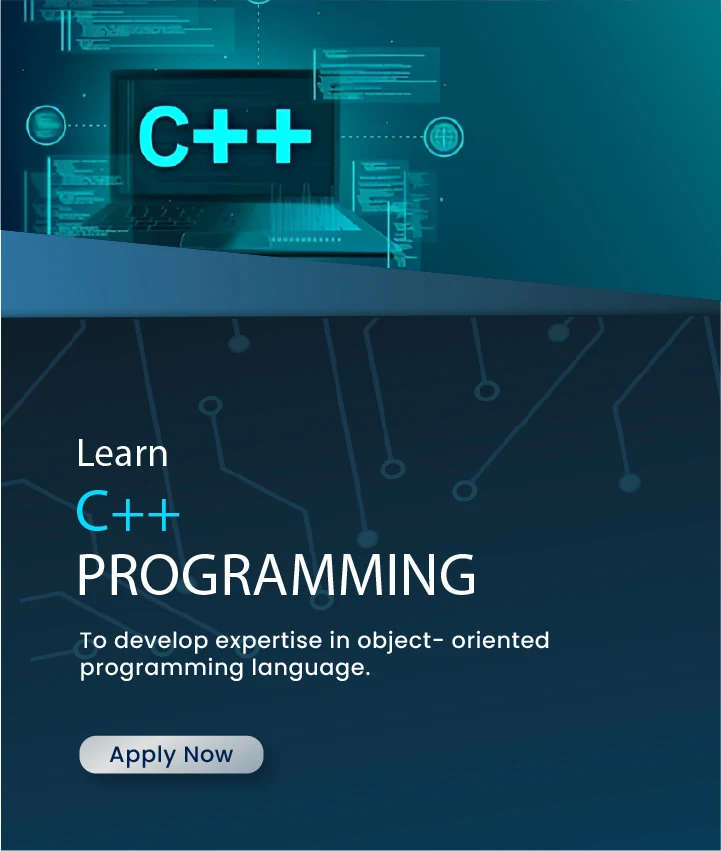


C++ language is the world's most admired language for the last 40 years for developing higher-performance operating systems, In-game programming, browsers, applications, and much more. In this course, you will get to know about the uses and features, arrays, loops, switch systems, and object-oriented concepts of programming. This course opens up wide opportunities to explore yourself more in a programming language. You can get hired by MNC companies and big private and government companies or organizations.
Course Highlights
1. |
Understanding of Classes and objects |
2. |
OOP (Object-Oriented Programming) |
3. |
Dynamic memory location |
4. |
File handling |
5. |
10+ Assignment |
6. |
45 Hours Of Training |
7. |
9 Course Module |
8. |
1 Year Free Backup Classes |
Learning Outcome
| • | Develop a great knowledge of the C++ language and its uses, characteristics, and capabilities |
| • | Learn object-oriented programming (OOP) and their functionalities |
| • | Understanding of many concepts such as inheritance, data binding, polymorphism, etc. |
| • | Learn Different problem-solving techniques. |
| • | Understanding of defensive programming concepts. |
| • | Ability to handle different possible errors using error handling. |
| • | Understanding of reading and writing data to and from files. |
Software and Apps that you will learn in this course




Course Content
Jobs You will Get After Completing Course
C++ is one of the standard languages used in backend development. A lot of tools and frameworks depend on the speed and efficiency of C++, therefore the demand for C++ developers is growing by 21% and the earnings have also increased by about 1.48%, which is the highest gain among all the languages.
| Job profile After completing this course |
Average salary ( 1+ year experience) |
|---|---|
| Junior Programmer. | 20k-25k |
| Senior Programmer | 40k to 50k |
| Software Developer | 35k to 40k |
| Game Programmer | 30k to 40k |
| Software Developer Engineer | 1.2L to 1.3L |
| C/C++ Analyst | 80k to 1 L |
| Programming Architect | 1.6L to 1.7L |

Backup Class

Flexible Timing

Fees Installment

Expert Trainer

100% job assistance

Free Library
.webp)
Live Project
.webp)
Practical learning

Hello,
My name is sarita,I'm student of IFDA institute. IFDA is the best computer training institute. Overall I love all the classes I have taken through IFDA institute,all the instructiors are kind and petient.They are very experienced in the program they are teaching.I have recommended this site to my school and friends. IFDA provides both practical and theoretical classes. Had a great experience here.☺️

I consider it very helpful because when when I first got into IFDA institute, it was very friendly and my knowledge in technology has gotten just not better but best. All the faculty here are very polite and ready to help whenever asked. Getting in this institute was my best decision.

I have a great experience in IFDA. The trainers are very supportive and explain every topic in detail. This Institute also provide backup classes on Saturday. I would like to suggest to join IFDA Institute to my friends and relatives. Thank u

0k +

0k +

0+
.webp)
0+
Frequently Asked Questions
C++ is an object-oriented programming language. It is an extension to C programming. C++ language will give you a deeper understanding of programming structures. With this course, you can develop different types of applications, games and software, and much more. C++ programming written and compiled in C executes much faster than other programming languages in terms of execution. It is suited to all operating systems like macOS, Windows, Linux, etc, and suitable for big projects such as cloud storage systems and 3d visual projects, etc.
Yes, IFDA provides a certificate after completion of the C++ programming course in Delhi.
This course is 3 months long only.
C++ programming has an extremely good career, it opens up various different opportunities with higher salary packages like robotics, machine learning, artificial intelligence, etc. The C++ programmers not only work in the computer field, but they can also explore their careers in the education and government sector fields.
Yes, we provide data structure with the C++ courses in detail.
Yes, we provide online classes who could not able to attend the classes due to long-distance or other reasons. You will get flexible batch timing according to your convenient time, students can also attend the individual sessions.
 (1).png)
 (1).png)
 (1).png)
 (1).png)
 (1).png)
 (1).png)
Get free counselling by our experience counsellors. We offer you free demo & trial classes to evaluate your eligibilty for the course.
Have you
Any question
Or need some help?
Please fill out the form below with your enquiry, and we will respond you as soon as possible.